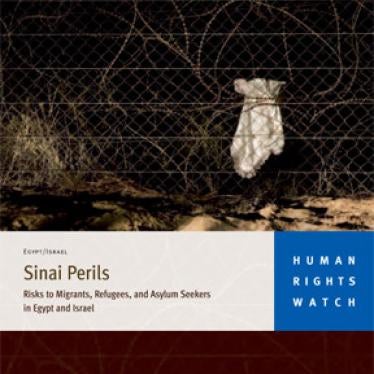(New York) - The Egyptian authorities should immediately cease deportation proceedings against two refugees from Darfur, Human Rights Watch said today.
Egyptian authorities are preparing to deport Mohammad Adam Abdallah and Ishaq Fadl Ahmad Dafa Allah back to Sudan, where they would face persecution. Both men have been granted formal refugee status by the United Nations refugee agency, which should protect them from deportation. Security officials moved Abdallah from the Khalifa police station to Aswan on April 4, 2010, in preparation for his deportation to Sudan on April 12. On April 7, security officials moved Dafa Allah to Khalifa police station, which is used as a deportation center. The Sudanese embassy issued travel documents for the two in early April, and a Sudanese embassy official informed Dafa Allah that the Egyptians intended to deport him back to Sudan.
"By definition, a refugee is someone who has a well-founded fear of persecution," said Joe Stork, deputy Middle East and North Africa director at Human Rights Watch. "To send that person back to a place where his life or freedom would be threatened is illegal and inhumane."
Egyptian security officials arrested the two refugees in Sinai in August 2009 and accused them of trying to cross the border into Israel, which they both deny. They are from the Zaghawa tribe in Darfur and were granted refugee status by the UN High Commissioner for Refugees (UNHCR) because they faced persecution in Sudan. Sudanese authorities continue to target Darfuri activists all across northern Sudan, where strict national security laws give authorities sweeping powers to arrest and detain people for months at a time without bringing charges.
The two men are also active members of the Zaghawa Association, a Darfuri community group in Egypt: Dafa Allah is the chairman and Abdallah is a member of the executive committee. Dafa Allah is also active in the Union of Darfur Associations in Egypt, and in that role was providing assistance to other refugees and asylum seekers.
Under international refugee law, including the Convention Relating to the Status of Refugees, to which Egypt is a party, a state may not deport persons recognized as refugees by UNHCR to countries where they are at risk of persecution. Refugees in Egypt remain vulnerable to deportation despite the fact that they hold documentation from the UNHCR.
On January 25, Egyptian authorities sent a UNHCR-recognized refugee, Mohammed al-Haj Abdallah, back to Sudan. Egyptian authorities arrested him in September 2009 in Ismailia, in northern Egypt, and detained him until he was deported. In December 2008 and January 2009, Egypt forcibly returned more than 45 Eritrean asylum seekers to Eritrea, where they face detention and the risk of torture, without first assessing their protection needs and providing them with the opportunity to make asylum claims.
Under refugee law and under the UN Convention Against Torture and the International Covenant on Civil and Political Rights, Egypt may not return anyone to a country where he or she faces the risk of torture, ill-treatment or persecution, an act known as "refoulement."
Egypt's ambassador to Geneva, Hisham Badr, is currently vice-chair of the UNHCR Executive Committee. Member states usually select the vice-chair to become chair the following year, an election due to take place in October 2010. In addition to its other violations, Egypt has come under criticism for the fatal shootings of at least 69 migrants on the Sinai border with Israel since mid-2007, including 12 this year.
"Egypt's violation of the most fundamental right of refugees - not to be forcibly returned to face persecution - is completely at odds with having an Egyptian diplomat hold this high-profile post in the UN agency tasked with the protection of refugees," said Stork.







